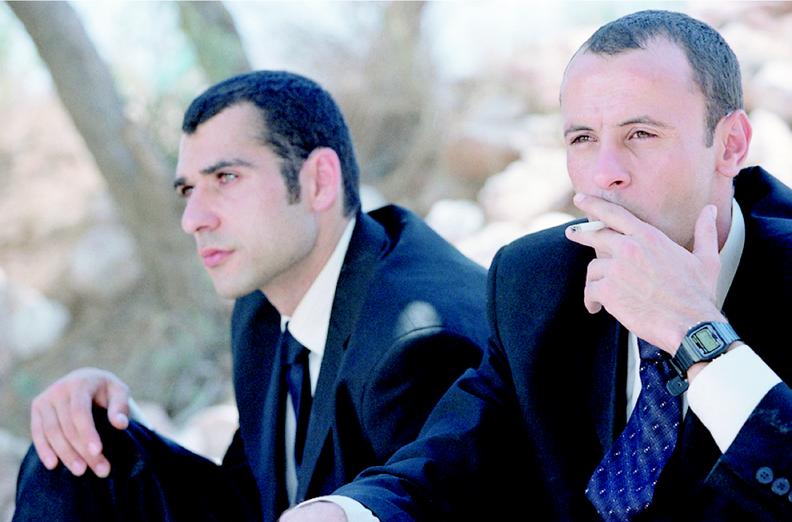Even more controversial than its nation (or non-nation) of origin has been the film's subject matter. Yes, Paradise Now does relate the story of two suicide bombers recruited by a radical Muslim organization to attack Israel. Yussi Zur, the father of a 17-year-old who was killed by a suicide bomber in Haifa, has organized an online petition asking the Academy to revoke the Best Foreign Film nomination on the grounds that it promotes terrorism. So far, about 25,000 people have signed the petition. So far, the Academy hasn't given in.
So what is it about this film that has got people in such an uproar?
The film introduces us to two childhood friends, Said and Khaled, a pair of young slackers who live in the war-torn town of Nablus. One day, a recruiter for a fundamentalist organization shows up and tells the duo that–congratulations–they have finally been chosen for a mission. They are to become martyrs for the cause. Said and Khaled greet this news with a mixture of pride and numb acceptance.
Slowly and with an almost documentary-like dispassion, the film shows how Said and Khaled are prepared for their mission. Writer/director Hany Abu-Assad apparently did his homework, combing through official Israeli reports and interrogation transcripts of failed suicide bombers to nail the details of the process.
Despite the grim nature of the tale at hand, the script finds room for snippets of black humor, as when Khaled tries to record his suicide video. He gets through his entire speech with passion and conviction. Unfortunately, the video camera is not working, and he is forced to enact it all again.
Though it concentrates on two people who have decided to become suicide bombers, the film hardly serves as an endorsement of such acts. (Is Psycho an “endorsement” of serial killers?) Abu-Assad populates his film with people of varying opinions. Not even Said and Khaled are fully assured of their beliefs. Said, for example, starts to doubt the justness of his cause when he meets pretty young Suha (Lubna Azabal), the daughter of a famed revolutionary. Despite her family history, she is a moderate Palestinian who does not support the violence sweeping her country. The impassioned discussions between Said and Suha form much of the film's philosophical backbone.
There is a scary fascination to watching Paradise Now, knowing what the end result of our protagonists' journey is supposed to be. Stuck in the worst of economic and social conditions, Said and Khaled seem to have no other choice. Certainly, the recruiters give them none, pumping them up with a nonstop barrage of nationalistic pride and religious fervor. “What happens afterward?” questions one of the bombers. “Two angels will pick you up,” says their handler. “Are you sure?” asks the other bomber. “Absolutely,” says the handler, sounding as if he'd rather not test out the theory himself.
By the time Said and Khaled find themselves shaved, dressed, locked into a pair of bomb-filled vests and smuggled across the border into Israel, there seems no turning back. But a funny thing happens on the way to the suicide bombing. Said and Khaled are spotted by police mere feet into Israeli territory. The entire operation falls apart, and Said and Khaled become separated. Fearing that Said might inform on them, the organizers of the operation disappear, leaving Said to wander around the border with a bomb he can neither take off nor disarm. Where this will all end up is anybody's guess, and Paradise Now milks the situation for all its gut-wrenching drama and absurd humor.
So, does Paradise Now “humanize” its terrorist characters? Of course it does. They are, after all, humans. I suppose this is a controversial approach, at least among people like George Bush, who prefer to see anyone who opposes American democratic policy as “evil.” Just look at the words from Yussi Zur's online petition: “I went to see Paradise Now to try to understand what message it was trying to convey. Was it that the murderer is human and is as deserving of sympathy as his victims? He is not.” Now, I can't in any way condone the actions of suicide bombers and terrorists (neither, for that matter, does this movie), but I can confirm that they are actually human beings. If you can't admit that a nation exists or that its people are human, can you really blame them for being angry and frustrated?
Undoubtedly, there are legions of people who just don't want to hear another side of the argument. Terrorists “hate freedom” and that's that. But, as Paradise Now eloquently argues, maybe you don't have to agree with the other side of an issue to at least listen to it. And perhaps–just perhaps–understanding another person's point of view is the key to solving this whole Middle East mess.



